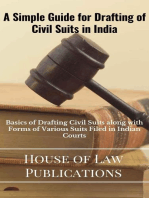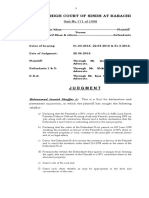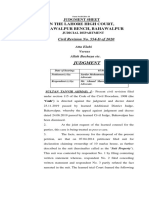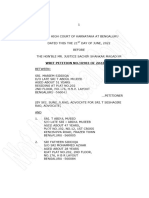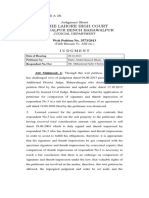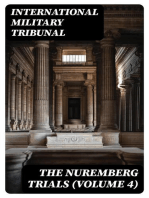2014LHC8161 Foreign Power of Attorney
2014LHC8161 Foreign Power of Attorney
Uploaded by
Adv Hafiz Taimoor QayyumCopyright:
Available Formats
2014LHC8161 Foreign Power of Attorney
2014LHC8161 Foreign Power of Attorney
Uploaded by
Adv Hafiz Taimoor QayyumOriginal Title
Copyright
Available Formats
Share this document
Did you find this document useful?
Is this content inappropriate?
Copyright:
Available Formats
2014LHC8161 Foreign Power of Attorney
2014LHC8161 Foreign Power of Attorney
Uploaded by
Adv Hafiz Taimoor QayyumCopyright:
Available Formats
JUDGMENT SHEET
IN THE LAHORE HIGH COURT AT LAHORE.
(JUDICIAL DEPARTMENT)
R.F.A.No.217 of 2013.
Dr. Ashiq Hussain Ghauri & another
Vs.
Mansoor Ali Poonawala, etc
JUDGMENT
DATE OF HEARING: 08-05-2014.
APPELLANTS BY: Mr. Muhammad Nawaz Kasuri,
Advocate.
RESPONDENT No.1 BY: Miss Shamsa Noor Virk,
Advocate along with respondent
No.1.
RESPONDENT No.2 BY: Mr. Aamir Mehmood, Advocate.
RESPONDENTS No.3-4 BY: Malik Noor Muhammad Awan,
Advocate.
AMIN-UD-DIN KHAN, J. Through this appeal, appellants
have challenged the judgment & decree dated 17.11.2012 passed
by the learned Civil Judge 1st Class, Lahore, whereby the suit
filed by the appellants-plaintiffs was dismissed.
2. Briefly, the facts as leading to this appeal are that on
07.10.2006 appellants-plaintiffs filed a suit for declaration,
cancellation of documents and permanent injunction. The written
statement was filed and suit was contested. Learned trial court
framed the issues and invited the parties to produce their
respective evidence. Both the parties produced oral as well as
documentary evidence in support of their versions. After the
completion of trial, learned trial court vide judgment & decree
RFA No.217 of 2013. 2
dated 17.11.2012 dismissed the suit. Hence, this appeal by the
plaintiffs-appellants.
3. Learned trial court vide order dated 03.02.2009
framed the following issues:-
1. Whether general power of attorney dated
08.08.1994 in favour of defendant No.1 and the sale
deed dated 22.11.1994 in favour of defendants No.3
& 4 are a result of fraud against the facts and liable
to be declared in effective qua the rights of the
plaintiff? OPP
2. Whether the plaintiff is entitled to the decree for
declaration, cancellation of documents and
permanent injunction as prayed for? OPP
3. Whether the suit has been filed malafidely and to
harass and blackmail the defendants? OPD 3 & 4.
4. Whether the defendant No.3 has become the
absolute and sole owner of the property after
purchasing the share of the defendant No.4? OPD 3
& 4.
5. Whether the suit is hopelessly barred by limitation?
OPD 3 & 4.
6. Whether the suit is not maintainable in its present
form? OPD 3 & 4.
7. Whether the plaintiffs have not come to the court
with clean hands? OPD 3 & 4.
8. Whether the defendant is also entitled to receive
value of his improvements made on the suit
property? OPD 3 & 4.
9. Whether the suit is bad for mis-joinder and non-
joinder of necessary parties? OPD 3 & 4.
10. Whether the plaintiff has no cause of action and
locus standi to file the suit? OPD 3 & 4.
11. Whether the plaintiffs have concealed the material
and relevant facts from the court? OPD 3 & 4.
RFA No.217 of 2013. 3
12. Whether the suit is dismissed in view of preliminary
objection No.12? OPD 3 & 4.
13. Relief.
Learned trial court decided issue No.1 against the plaintiffs.
Issue No.2 was also decided against the plaintiffs on the basis of
findings on issue No.1. Issues No.3 and 8 were decided as not
pressed. Issue No.4 was decided in favour of defendants No.3
and 4. Issue No.5 which is with regard to the limitation was also
decided in favour of defendants No.3 and 4 and against the
plaintiffs. Issues Nos.6, 7, 10, 11 and 12 were decided against the
plaintiffs on the basis of findings on issues No.1 and 2. Issue
No.9 was decided against defendants No.3 and 4 on the basis that
no evidence has been produced.
4. Learned counsel for the appellants argues that in
September, 2005 plaintiffs came to know that the suit plot has
been transferred in the names of defendants No.3 and 4,
therefore, defendant No.1 was contacted who refused to give any
detail to the plaintiffs as there was a power of attorney executed
in favour of defendant No.1 by the plaintiffs in the year 1990;
that when thorough probe was made, plaintiffs came to know
that the power of attorney which was executed in the year 1990
in United Kingdom, was got registered with Sub Registrar
Lahore in the year 1994 and on the basis of that power of
attorney suit plot was got transferred in the names of defendants
No.3 and 4 and subsequently defendant No.4 also surrendered
RFA No.217 of 2013. 4
her rights in favour of defendant No.3 and now defendant No.3
claims to be the full owner of suit plot. Learned counsel argues
that power of attorney which was given in the year 1990, under
section 26 of the Registration Act, 1908 could have been
registered with Sub Registrar within four months and the same is
shown to have been registered in the year 1994 i.e. after four
years of the execution of power of attorney, therefore, its
registration is against the law and on the basis of said power of
attorney further transfer of property is illegal. Learned counsel
argues that the findings recorded by the learned trial court are
absolutely against the law. Learned counsel for the appellants has
mainly argued on the point that registration of power of attorney
in Pakistan after four years from the date of its execution as the
same was executed in United Kingdom in the year 1990, was
defective and as such all the superstructure on the basis of said
power of attorney falls on the ground. Learned counsel for the
appellants has mainly pressed this legal point before us.
5. On the other hand, learned counsel representing
respondent No.1 has stated that he was validly appointed
attorney of appellants-plaintiffs and on the basis of power of
attorney he has rightly transferred the suit property in favour of
defendants No.3 and 4 through registered sale deed.
6. Learned counsel representing respondent
No.2/Housing Society states that respondent No.2 has rightly
transferred the suit property in the names of defendants No.3 and
RFA No.217 of 2013. 5
4, therefore, the findings recorded by the learned trial court are in
accordance with law.
7. Learned counsel for respondents-defendants No.3 &
4 argues that power of attorney is admitted one, whereupon the
duty was validly paid in Pakistan and there is no defect in the
said document; that the findings recorded by the learned trial
court are in accordance with law; that a huge building consisting
upon double story has been erected over the suit plot after its
purchase and that the plaintiffs or their representative who is
resident of Lahore never raised the objection and as such the suit
has dishonestly been filed. Prays for dismissal of this appeal.
8. We have heard the learned counsel for the parties at
full length and also gone through the record minutely with their
able assistance.
9. We have noticed that the pivotal point for
determination in this appeal is that whether the registration of
power of attorney, which was executed in United Kingdom in the
year 1990 the execution of which is admitted one, was necessary
in Pakistan for sale of suit property and what period is provided
for registration of a document which has been executed out of
the country.
10. Learned counsel for the appellants has referred
section 26 of the Registration Act, 1908, which is as follows:
“Section 26: Documents executed out of the
Provinces etc: When a document, purporting to
RFA No.217 of 2013. 6
have been executed by all or any of the parties out
of Pakistan, is not presented for registration till
after the expiration of the time hereinbefore
prescribed in that behalf, the registering officer, if
satisfied-
(a) that the instrument was so executed; and
(b) that it has been presented for registration within
four months after its arrival in Pakistan.
may, on payment of the proper registration-fee,
accept such document for registration.”
The copy of power of attorney has been produced as Ex.P-4 by
the plaintiff. This power of attorney is specifically with regard to
the suit property and irrevocable by the plaintiffs in favour of
defendant No.1, which was executed in United Kingdom on 30th
November, 1990 and authenticated by the solicitors, oath
commissioner as well as representatives of the Federal
Government in the Embassy of Pakistan at London. The duty
was paid on this power of attorney in Pakistan and noted by the
Sub Registrar at Sr. No.3283 on 08.08.1994.
11. The relevant sections to resolve the controversy in
issue are Sections 32 and 33 of the Registration Act, 1908, which
are also reproduced herein:
“32. Persons to present document for
registration. Except in the cases mentioned in
section 89, every document to be registered under
this Act, whether such registration be compulsory
or optional, shall be presented,
(a) by some person executing or claiming under the
same, or, in the case of a copy of a decree or order,
claiming under the decree or order; or
RFA No.217 of 2013. 7
(b) by the representative or assignee of such person; or
(c) by the agent of such a person, representative or
assignee, duly authorized by power-of-attorney
executed and authenticated in manner hereinafter
mentioned.
33. Powers-of-attorney recognizable for
purposes of section 32. (1) For the purposes of
section 32, the following power-of-attorney shall
alone be recognized, namely:-
(a) if the principal at the time of executing the
power-of-attorney resides in any part of Pakistan in
which this Act is for the time being in force, a
power-of-attorney executed before and
authenticated by the Registrar or Sub-Registrar
within whose district or sub-district the principal
resides;
(b) if the principal at the time aforesaid resides in
any other part of Pakistan in which this Act is not in
force, a power-of-attorney executed before and
authenticated by any Magistrate;
(c) if the principal at the time aforesaid does not
reside in Pakistan, power-of-attorney executed
before and authenticated by a Notary Public or any
Court, Judge, Magistrate, Pakistani Consulate or
Vice-Consul, or representative of the Federal
Government:
Provided that the following persons shall not be
required to attend at any registration-office or Court
for the purpose of executing any such power-of-
attorney as is mentioned in clauses (a) and (b) of this
section, namely:-
(i) persons who by reason of bodily infirmity are
unable without risk or serious inconvenience
so to attend;
(ii) persons who are in jail under civil or criminal
process; and
(iii) persons exempt by law from personal
appearance in Court.
(2) In the case of every such person the Registrar or
Sub-Registrar or Magistrate, as the case may be, if
satisfied that the power-of-attorney has been
voluntarily executed by the person purporting to be
the principal, may attest the same without requiring
RFA No.217 of 2013. 8
his personal attendance at the office or Court
aforesaid.
(3) To obtain evidence as to the voluntary nature of
the execution, the Registrar or Sub-Registrar or
Magistrate may either himself go to the house of the
person purporting to be the principal, or to the jail in
which he is confined, and examine him, or issue a
commission for his examination.
(4) Any power-of-attorney mentioned in this
section may be proved by the production of it
without further proof when it purports on the face of
it to have been executed before and authenticated by
the person or Court hereinbefore mentioned in that
behalf.”
The execution of power of attorney is not denied. The only
alleged defect highlighted by the learned counsel for the
appellants that same was got registered in Pakistan after four
years of its execution in abroad. We have dilated upon this point
and a specific question was posed to the learned counsel for the
parties.
“Whether power of attorney executed in United Kingdom,
authenticated by the representative of Federal Government
in U.K was further required to be registered with Sub
Registrar in Pakistan?
12. Learned counsel for the parties advanced general
arguments on this point. As per learned counsel for the
appellants while referring section 26 of the Registration Act,
1908 that it was necessary that same be registered in Pakistan
within four months from the date of its execution. As per learned
counsel for the respondents it was not required registration with
Sub Registrar in Pakistan.
RFA No.217 of 2013. 9
13. We have thoroughly examined this question.
Section 33 of the Registration Act is relevant with regard to the
point in issue in this case. According to Clause (c) of Sub
Section (1) of Section 33 of the Registration Act, power of
attorney in question which was authenticated by the
representative of Federal Government in U.K was a valid power
of attorney for presentation of sale deed and for registration
before Sub Registrar. The only requirement of power of attorney
executed abroad and authenticated in accordance with Clause (c)
of Sub Section (1) of Section 33 is that the duty required under
the law is to be paid in Pakistan and the same has admittedly
been paid in Pakistan in the year 1994. The Sub Registrar has
endorsed the payment of duty and noted the power of attorney in
his record, therefore, it was a valid power of attorney on the basis
of which the suit property had been sold in favour of
respondents-defendants No.3 and 4. The execution of power of
attorney is not denied, its authentication by solicitor, oath
commissioner and the representative of Federal Government of
Pakistan at London has also not been disproved and the case
pleaded by the appellants in their plaint that after execution of
power of attorney a cheque issued by their agent was dishonored,
therefore, the relationship of faith of principal upon the attorney
was no more left. It is not the case of appellants that they ever
revoked that power of attorney and further it is also not denied
that the alleged power of attorney was not irrevocable. We are of
RFA No.217 of 2013. 10
the view that if an irrevocable power of attorney is issued in
favour of agent, it is between the lines that there is no interest of
principal in the property about which power of attorney has been
given. It means that there is no interest of principal left in the
property about which an irrevocable power of attorney has been
given. In the circumstances of this case, when the power of
attorney was given in the year 1990 and duty was paid in
Pakistan in the year 1994, it was a valid power of attorney which
also has the presumptions contained under Article 95 of the
Qanun-e-Shahadat Order, 1984, on the basis of which the
property has been transferred in favour of defendants No.3 and 4.
The transaction whereof has been confirmed by respondent No.1,
who appeared before the Court today. In this view of the matter,
the findings on issue No.1 recorded by the learned trial court
against the appellants-plaintiffs are absolutely in accordance with
law. The findings of learned trial court on the point of limitation
are correct, as irrevocable power of attorney is of the year 1990
and the suit property has been transferred on the basis of this
power of attorney through registered sale deed registered on
22.11.1994 and the suit has been filed on 07.10.2006. No other
issue has been agitated before us. Consequently, we see no force
in this appeal. It is hereby dismissed with costs throughout.
(FAISAL ZAMAN KHAN) (AMIN-UD-DIN KHAN)
JUDGE JUDGE
Qurban*
Approved for Reporting
You might also like
- Simple Guide for Drafting of Civil Suits in IndiaFrom EverandSimple Guide for Drafting of Civil Suits in IndiaRating: 4.5 out of 5 stars4.5/5 (4)
- 2020LHC3278Document16 pages2020LHC3278WaqasSanaNo ratings yet
- Stereo. H C J D A-38. Judgment Sheet in The Lahore High Court at LahoreDocument11 pagesStereo. H C J D A-38. Judgment Sheet in The Lahore High Court at LahoreUsman AsifNo ratings yet
- Hiba CaselawDocument107 pagesHiba CaselawBilal Shadani50% (2)
- WP-Kahloon 4-Apr HC FAMILY Ghulam Rasool Dowery ArticlesDocument13 pagesWP-Kahloon 4-Apr HC FAMILY Ghulam Rasool Dowery ArticlesMohammad Mohsin KhanNo ratings yet
- Order Sheet in The Lahore High Court Multan Bench Multan. Judicial DepartmentDocument9 pagesOrder Sheet in The Lahore High Court Multan Bench Multan. Judicial DepartmentAun NaqviNo ratings yet
- 2022LHC4086Document24 pages2022LHC4086co.dsjbhakkarNo ratings yet
- Transfer of Property - Sale - Absolute Owner - Conditional 2010 SCDocument16 pagesTransfer of Property - Sale - Absolute Owner - Conditional 2010 SCSridhara babu. N - ಶ್ರೀಧರ ಬಾಬು. ಎನ್No ratings yet
- In The High Court of Sindh at KarachiDocument16 pagesIn The High Court of Sindh at Karachi12345 678910No ratings yet
- Citation On O. XIX Rule 1&2 of CPCDocument7 pagesCitation On O. XIX Rule 1&2 of CPCaslamali02022No ratings yet
- Nirav Deepak Modi of Bombay Vs Najoo Behram BhiwanMH120117COM231413Document9 pagesNirav Deepak Modi of Bombay Vs Najoo Behram BhiwanMH120117COM231413Rajesh AroraNo ratings yet
- Void Deed JudgementDocument12 pagesVoid Deed JudgementSarthak DasNo ratings yet
- 2011 11 1501 19663 Judgement 15-Jan-2020Document14 pages2011 11 1501 19663 Judgement 15-Jan-2020SravyaNo ratings yet
- K Bhaskaram and Anr Vs Mohammad Moulana and Ors On 25 July 2005Document7 pagesK Bhaskaram and Anr Vs Mohammad Moulana and Ors On 25 July 2005aswamethaassociates.2023No ratings yet
- Appeal Against Dismissal of Judgment & DecreeDocument18 pagesAppeal Against Dismissal of Judgment & Decreejkjnknn54No ratings yet
- Anju Bala AffidavitDocument4 pagesAnju Bala AffidavitnavneetsinghghdNo ratings yet
- Hitachi Case AnalysisDocument9 pagesHitachi Case AnalysisBisma AwanNo ratings yet
- ORAL PartitionDocument9 pagesORAL PartitionhitejoNo ratings yet
- Writ Petition DraftingDocument9 pagesWrit Petition DraftingAnuj Kumar75% (4)
- 2022LHC3672Document10 pages2022LHC3672TipuNo ratings yet
- Sham Pundlalik Dhumatkar and Ors Vs Pushpa MohanlaMH2016160816162646131COM614695Document6 pagesSham Pundlalik Dhumatkar and Ors Vs Pushpa MohanlaMH2016160816162646131COM614695Rajesh AroraNo ratings yet
- 2015 Y L R 715 (Sindh) Before Muhammad Iqbal Kalhoro, J ABDUL FATAH - Applicant Versus MAHARRAM ALI and 4 Others - RespondentsDocument6 pages2015 Y L R 715 (Sindh) Before Muhammad Iqbal Kalhoro, J ABDUL FATAH - Applicant Versus MAHARRAM ALI and 4 Others - RespondentsTariq BalochNo ratings yet
- Fayaz Ahmad Rather Vs Union Territory of JK and Ors On 3 Apr 2023Document18 pagesFayaz Ahmad Rather Vs Union Territory of JK and Ors On 3 Apr 2023neha chawlaNo ratings yet
- Kyafunene Samuel & Ors Vs Musime James & Ors MA No 3347 of 2023Document13 pagesKyafunene Samuel & Ors Vs Musime James & Ors MA No 3347 of 2023atwine3No ratings yet
- UlDocument20 pagesUlAkshita SoniNo ratings yet
- JUDGEMENT-Polyflor Limited vs. A.N. Goenka and OrsDocument13 pagesJUDGEMENT-Polyflor Limited vs. A.N. Goenka and OrsShirish ParasharNo ratings yet
- Prevention of Fragmentation ActDocument13 pagesPrevention of Fragmentation Actm a zubairNo ratings yet
- Principles of Law Restated by Supreme Court For The Guidance of Courts in Handling Frivolous Litigations 2012 SCDocument53 pagesPrinciples of Law Restated by Supreme Court For The Guidance of Courts in Handling Frivolous Litigations 2012 SCSridhara babu. N - ಶ್ರೀಧರ ಬಾಬು. ಎನ್No ratings yet
- 2015LHC8268Document10 pages2015LHC8268WaqasSanaNo ratings yet
- 2012LHC941Document7 pages2012LHC941zhkk.pkNo ratings yet
- Banubee W - D Gani and Another VS Bondibai W - o Suleman Nayata and OthersDocument22 pagesBanubee W - D Gani and Another VS Bondibai W - o Suleman Nayata and OthersRITU RAJ ISE-2020-24No ratings yet
- WP10903 22 21 06 2022Document8 pagesWP10903 22 21 06 2022hameri6099No ratings yet
- 2013 LHC 2988Document4 pages2013 LHC 2988afshanfaisal59No ratings yet
- Legal Heir CPCDocument16 pagesLegal Heir CPCBharti KumariNo ratings yet
- 2021LHC3692Document18 pages2021LHC3692co.dsjbhakkarNo ratings yet
- Raj Kaur Vs Mitlesh & Ors On 5 May, 2021Document16 pagesRaj Kaur Vs Mitlesh & Ors On 5 May, 2021ajayrupnawar3No ratings yet
- Commercial Court 2013 97Document15 pagesCommercial Court 2013 97nicoledella638No ratings yet
- Karnataka HC Guidelines 414313Document15 pagesKarnataka HC Guidelines 414313kamba pavan kumarNo ratings yet
- 431 Umaji Satwaji Shep V Gulam Mohmood 21 Oct 2022 444478Document8 pages431 Umaji Satwaji Shep V Gulam Mohmood 21 Oct 2022 444478adityawa2No ratings yet
- In The Court of The Senior Civil Judge and JMFC at Anekal: O.S. No.302/2008Document9 pagesIn The Court of The Senior Civil Judge and JMFC at Anekal: O.S. No.302/2008greenrosenaikNo ratings yet
- Damodaram Sanjivayya National Law Universi Ty: Bhagwandas V. Prabhati Ram and AnrDocument12 pagesDamodaram Sanjivayya National Law Universi Ty: Bhagwandas V. Prabhati Ram and AnrJeevan PramodNo ratings yet
- MJ Ew NZ My Y2 Ztcy 1 K YzgzDocument14 pagesMJ Ew NZ My Y2 Ztcy 1 K Yzgztahirhussainbozdar919No ratings yet
- Application Under Order 7 Rule 11Document5 pagesApplication Under Order 7 Rule 11Chickanna Nandeesh100% (1)
- In The High Court of Sindh at Karachi: Suit No. 1142 of 2003 and Suit No. 1318 of 2007Document17 pagesIn The High Court of Sindh at Karachi: Suit No. 1142 of 2003 and Suit No. 1318 of 2007Tariq Hussain AdvNo ratings yet
- HC Land Division 2017 31Document9 pagesHC Land Division 2017 31Namamm fnfmfdnNo ratings yet
- 2012 LHC 1248Document12 pages2012 LHC 1248optimist_24No ratings yet
- Lahore High Court, Lahore: Judicial Department C. R. No. 1933 / 2012Document10 pagesLahore High Court, Lahore: Judicial Department C. R. No. 1933 / 2012co.dsjbhakkarNo ratings yet
- Rajesh V Choudhary Vs Kshitij Rajiv Torka and OrsMH201519091519125799COM279936Document23 pagesRajesh V Choudhary Vs Kshitij Rajiv Torka and OrsMH201519091519125799COM279936Shubhangi SinghNo ratings yet
- 2014LHC779Document12 pages2014LHC779Asad KhanNo ratings yet
- Govardhandas Nanji Taunk Vs Balram N. Taunk & Ors. On 25 April, 2012Document21 pagesGovardhandas Nanji Taunk Vs Balram N. Taunk & Ors. On 25 April, 2012ravi_bhateja_2No ratings yet
- Civil Cases ObservationDocument7 pagesCivil Cases Observationmaru.hirva.123No ratings yet
- 2021LHC2934Document5 pages2021LHC2934Saira ShahzadiNo ratings yet
- 2022LHC4521Document11 pages2022LHC4521nasirshahgeo786No ratings yet
- Janak Datwani v. Jaskirat SukhwantDocument15 pagesJanak Datwani v. Jaskirat Sukhwantmohitgupta.uilsNo ratings yet
- New Rich Text DocumentDocument4 pagesNew Rich Text DocumentSaadZulfiqarNo ratings yet
- New Rich Text DocumentDocument4 pagesNew Rich Text DocumentSaadZulfiqarNo ratings yet
- Judgment Sheet: in The High Court of Sindh Bench at SukkurDocument12 pagesJudgment Sheet: in The High Court of Sindh Bench at SukkurAli HijaziNo ratings yet
- Supreme Court Judgment On Family Settlement Deed As Piece of Corroborative EvidenceDocument32 pagesSupreme Court Judgment On Family Settlement Deed As Piece of Corroborative EvidenceLatest Laws Team100% (1)
- English in Law (Advanced): A Compendium of Legal English for Advanced and Proficiency StudentsFrom EverandEnglish in Law (Advanced): A Compendium of Legal English for Advanced and Proficiency StudentsNo ratings yet
- Pre-Bar Review 2018 - ScheduleDocument3 pagesPre-Bar Review 2018 - ScheduleDaniel Torres AtaydeNo ratings yet
- Asgnment On LawsDocument5 pagesAsgnment On LawsShahan AliNo ratings yet
- Aruelo Vs CADocument7 pagesAruelo Vs CAGlenn DanaoNo ratings yet
- Understanding The Basics of BusinessDocument2 pagesUnderstanding The Basics of BusinessFityat Sidik PaningalNo ratings yet
- Petitioner Respondents: Omar Villarba, Court of Appeals and People of The PhilippinesDocument19 pagesPetitioner Respondents: Omar Villarba, Court of Appeals and People of The PhilippinesJakie CruzNo ratings yet
- Cyber Journalism 1Document60 pagesCyber Journalism 1MANISHMRINUNo ratings yet
- Vexatious Proceedings Act: Laws of KenyaDocument5 pagesVexatious Proceedings Act: Laws of KenyaDiana WangamatiNo ratings yet
- AsdffdfdddDocument1 pageAsdffdfdddFVNo ratings yet
- Angelina Jolie V Brad Pitt: Order On Misconduct by Judge John OuderkirkDocument44 pagesAngelina Jolie V Brad Pitt: Order On Misconduct by Judge John OuderkirkCalifornia Judicial Branch News Service - Investigative Reporting Source Material & Story IdeasNo ratings yet
- Order Sample, Affirming Decision of Municiapal Trial CourtDocument5 pagesOrder Sample, Affirming Decision of Municiapal Trial CourtJassey Jane OrapaNo ratings yet
- Aberratio IctusDocument9 pagesAberratio IctusJustin GarciaNo ratings yet
- The Value of Money The Value of Labor Power and The Marxian Transformation Problem Foley 1982Document12 pagesThe Value of Money The Value of Labor Power and The Marxian Transformation Problem Foley 1982Espinete1984No ratings yet
- People v. Perez G.R. No. L-21049 December 22, 1923 Sedition (CRIM LAW2)Document2 pagesPeople v. Perez G.R. No. L-21049 December 22, 1923 Sedition (CRIM LAW2)Phearl UrbinaNo ratings yet
- Umar Ibn Al-Khattab PDFDocument32 pagesUmar Ibn Al-Khattab PDFMaryam NaeemNo ratings yet
- CIPS Code of Conductv2 10-9-2013Document1 pageCIPS Code of Conductv2 10-9-2013OgochukwuNo ratings yet
- pUNISHMENT Ipc 1Document32 pagespUNISHMENT Ipc 1Amisha PrakashNo ratings yet
- Whitney Harris ArticleDocument21 pagesWhitney Harris ArticleStanlNo ratings yet
- Regional Trial Court: Summary of Admitted Facts and Proposed Stipulation of FactsDocument2 pagesRegional Trial Court: Summary of Admitted Facts and Proposed Stipulation of FactsLeo Joselito Estoque BonoNo ratings yet
- Annotated BibliographyDocument6 pagesAnnotated Bibliographyapi-285701510No ratings yet
- 574 Supreme Court Reports Annotated: People vs. PincaDocument9 pages574 Supreme Court Reports Annotated: People vs. Pincachristopher1julian1aNo ratings yet
- Greek and Roman Political InstitutionsDocument5 pagesGreek and Roman Political InstitutionsBrian Roberts0% (2)
- Digested Cases On Certiorari Prohibition and MandamusDocument12 pagesDigested Cases On Certiorari Prohibition and MandamuslonitsuafNo ratings yet
- PetitionDocument183 pagesPetitionCourtneyNo ratings yet
- Digital Marketing Vs Traditional MarketingDocument2 pagesDigital Marketing Vs Traditional MarketingLearner's LicenseNo ratings yet
- Chapter 2 WPS OfficeDocument4 pagesChapter 2 WPS OfficeOmelkhair YahyaNo ratings yet
- Balfour Murder AppealDocument5 pagesBalfour Murder AppealChrisNo ratings yet
- People V BuanDocument1 pagePeople V BuanAllen Windel BernabeNo ratings yet
- Maternity and Casual Leave To HP Contract Employees 2014-15Document2 pagesMaternity and Casual Leave To HP Contract Employees 2014-15VIJAY KUMAR HEERNo ratings yet
- Halaguena Vs Phil AirlinesDocument1 pageHalaguena Vs Phil Airlinesjed_sindaNo ratings yet
- A New Commandment - Tallis PDFDocument7 pagesA New Commandment - Tallis PDFarnoldlee1No ratings yet
